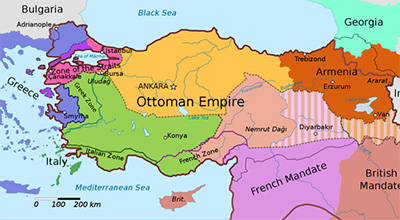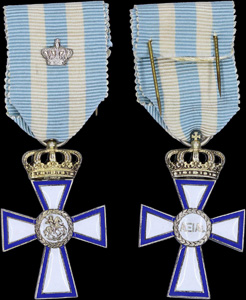Greco-Turkish War (1919-1922)
The Greco-Turkish War of 1919-1922 was fought between Greece and the Turkish National Movement (TNM) during the partitioning of the Ottoman Empire following WWI. Armed conflict commenced with the landing of 20,000 Greek forces, supported by Allied naval forces, at Smyrna on May 15, 1919. The Greeks advanced inland and took control of western and northwestern parts of Anatolia, including the cities of Manisa, Bahkesir, Aydn, Kutahhya, Bursa, and Esktsehir. The Battle of Afyonkarahisar-Eskisehir (July 1921), on the outskirts of Ankara, was the last major Greek victory. Hellenists and Ottomans fought to a bloody draw in the Battle of Sakarya (August and September 1921), and a stalemate ensued. Weary of war and no longer fed on success, Greek public opinion turned against the war, and a creeping demoralization ensued. Turkey grew stronger, and Greece grew weaker. The dam burst with the Ottoman counteroffensive at the Battle of Dumlupinar (August 26-30, 1922).
The Armistice of Mudanya was concluded on October 11, 1922. The Allies (Britain, France, and Italy) retained control of eastern Thrace and the Bosporus. The Greeks were to evacuate those areas. The agreement came into force starting October 15, 1922, one day after the Greek side agreed to sign it.
Violence erupted, continuing the Greek genocide that had commenced after the Balkan Wars (1912-1913). In the Great Fire of Smyrna (September 14, 1922), the Greek and Armenian quarters of the city were destroyed, while the Turk and Jewish quarters remained. From 1913-1922, roughly 700,000 Christian Greeks perished. In a population exchange of 1923, over one million Greeks were expelled from Asia Minor. The 1955 Istanbul Pogrom caused many of the Hellenists remaining in Turkey to flee to the Peloponnese.
The Greco-Turkish War is a little known but important chapter in 20th century history, which has profound reverberations in the 21st century. Valor and vanity, and brilliance and blame, characterize both sides. The Western Allies were culpable in self-interested, colonial politics, and in making promises they did not intend to keep. The Soviets began their great expansions early, beginning the Cold War 25 years before anyone in the West realized it.
Nonetheless, in its death throes the Ottoman Empire, which was finally dissolved in 1922, butchered over two million civilians, largely Greek and Armenian Christians. The Turks can justly point to a great victory in what they consider to be the war of independence of their homeland, and they do celebrate it as Victory Day every 30 August. However, long after the trumpets become quiet, soldiers stop marching, and crowds return home, the blood of their victims will cry out from the ground.

Greece issued the Cross of Valor, the second highest state honor, awarded for acts of bravery or distinguished leadership on the field of battle. Instituted on three occasions: (1) May 13, 1913 for the Balkan Wars, but not awarded until 1921 for the Greco-Turkish War of 1919-1922; (2) November 11, 1940 for the Greco-Italian War, and (3) finally in 1974.
The Cross was liberally awarded, beginning in 1921, during the Greco-Turkish War of 1919-1922 It was issued in three grades: (1) Commander's Cross on a neck ribbon; (2) Gold Cross; and (3) unenameled Silver Cross. There were no limits on the number of awards and additional awards were noted by a royal crown device on the ribbon drape.

Greek Gold Cross of Valor
The medal is in the form of a white enamel crowned cross with the arms bordered in blue enamel. The obverse bears the image of St. Demetrios in circle of narrow laurel leaves. The reverse bears the Greek inscription FOR VALOR.
The Greco-Turkish War of 1919-1922 was fought between Greece and the Turkish National Movement (TNM) during the partitioning of the Ottoman Empire following WWI. Armed conflict commenced with the landing of 20,000 Greek forces, supported by Allied naval forces, at Smyrna on May 15, 1919. The Greeks advanced inland and took control of western and northwestern parts of Anatolia, including the cities of Manisa, Bahkesir, Aydn, Kutahhya, Bursa, and Esktsehir. The Battle of Afyonkarahisar-Eskisehir (July 1921), on the outskirts of Ankara, was the last major Greek victory. Hellenists and Ottomans fought to a bloody draw in the Battle of Sakarya (August and September 1921), and a stalemate ensued. Weary of war and no longer fed on success, Greek public opinion turned against the war, and a creeping demoralization ensued. Turkey grew stronger, and Greece grew weaker. The dam burst with the Ottoman counteroffensive at the Battle of Dumlupinar (August 26-30, 1922).
The Armistice of Mudanya was concluded on October 11, 1922. The Allies (Britain, France, and Italy) retained control of eastern Thrace and the Bosporus. The Greeks were to evacuate those areas. The agreement came into force starting October 15, 1922, one day after the Greek side agreed to sign it.
Violence erupted, continuing the Greek genocide that had commenced after the Balkan Wars (1912-1913). In the Great Fire of Smyrna (September 14, 1922), the Greek and Armenian quarters of the city were destroyed, while the Turk and Jewish quarters remained. From 1913-1922, roughly 700,000 Christian Greeks perished. In a population exchange of 1923, over one million Greeks were expelled from Asia Minor. The 1955 Istanbul Pogrom caused many of the Hellenists remaining in Turkey to flee to the Peloponnese.
The Greco-Turkish War is a little known but important chapter in 20th century history, which has profound reverberations in the 21st century. Valor and vanity, and brilliance and blame, characterize both sides. The Western Allies were culpable in self-interested, colonial politics, and in making promises they did not intend to keep. The Soviets began their great expansions early, beginning the Cold War 25 years before anyone in the West realized it.
Nonetheless, in its death throes the Ottoman Empire, which was finally dissolved in 1922, butchered over two million civilians, largely Greek and Armenian Christians. The Turks can justly point to a great victory in what they consider to be the war of independence of their homeland, and they do celebrate it as Victory Day every 30 August. However, long after the trumpets become quiet, soldiers stop marching, and crowds return home, the blood of their victims will cry out from the ground.

Greece issued the Cross of Valor, the second highest state honor, awarded for acts of bravery or distinguished leadership on the field of battle. Instituted on three occasions: (1) May 13, 1913 for the Balkan Wars, but not awarded until 1921 for the Greco-Turkish War of 1919-1922; (2) November 11, 1940 for the Greco-Italian War, and (3) finally in 1974.
The Cross was liberally awarded, beginning in 1921, during the Greco-Turkish War of 1919-1922 It was issued in three grades: (1) Commander's Cross on a neck ribbon; (2) Gold Cross; and (3) unenameled Silver Cross. There were no limits on the number of awards and additional awards were noted by a royal crown device on the ribbon drape.

Greek Gold Cross of Valor
The medal is in the form of a white enamel crowned cross with the arms bordered in blue enamel. The obverse bears the image of St. Demetrios in circle of narrow laurel leaves. The reverse bears the Greek inscription FOR VALOR.
Website Maintained by Keith Emroll